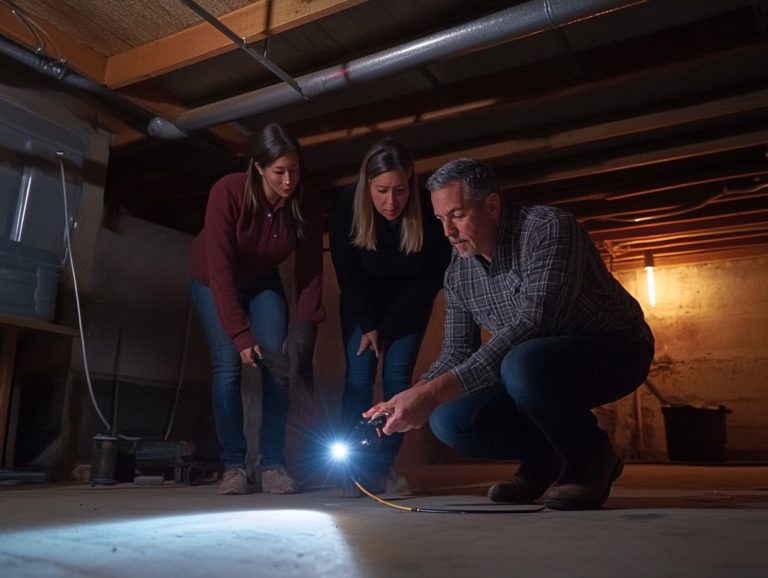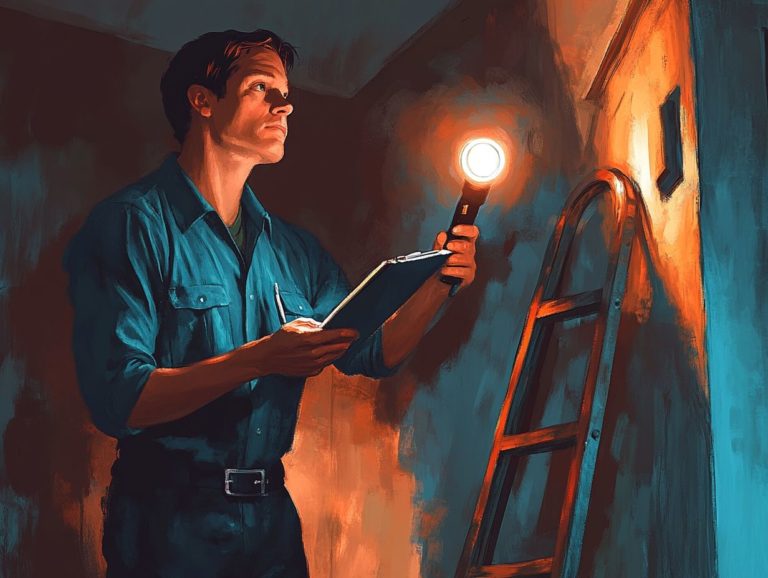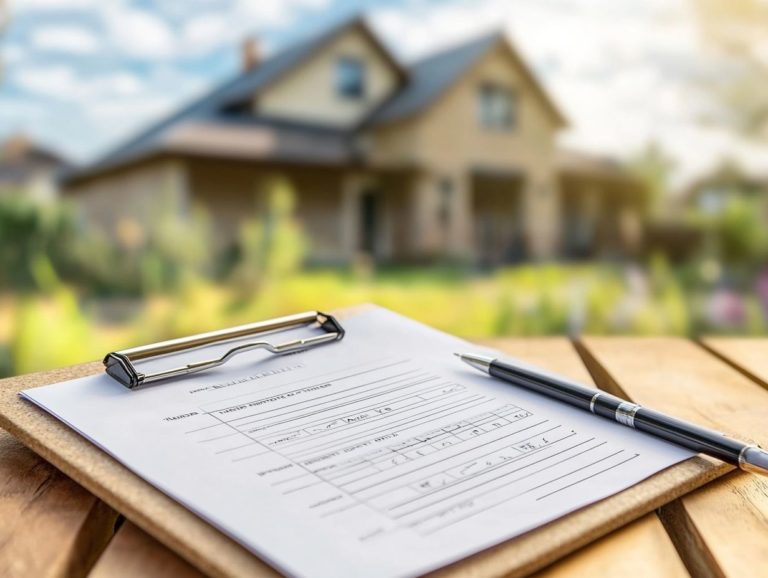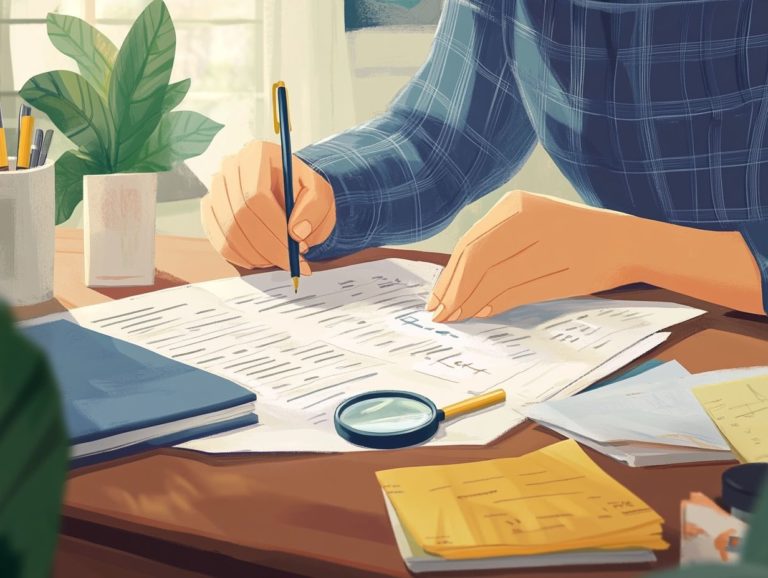What to Look for in a Home Inspection Report
Navigating the world of home buying can indeed feel overwhelming, particularly when it comes to deciphering home inspection reports. These documents are essential for revealing potential structural issues, safety hazards, and necessary repairs. Whether you’re a first-time buyer or a seasoned homeowner, understanding what to look for in a report can save you time, money, and unnecessary stress.
This article will break down key elements, offer tips for interpreting the findings, and provide guidance on collaborating effectively with home inspectors. This ensures you re fully prepared for the next steps in your home buying journey.
Contents
- Key Takeaways:
- Understanding Home Inspection Reports
- Key Elements to Look for in a Report
- Interpreting the Information in a Report
- Working with a Home Inspector
- Frequently Asked Questions
- What should I expect to see in a home inspection report?
- How can I ensure that my home inspection report is accurate and thorough?
- What types of issues or problems should I be particularly concerned about in a home inspection report?
- Are there any red flags I should watch out for in a home inspection report?
- What should I do if my home inspection report reveals multiple issues?
- Can I attend the home inspection and ask questions?
Key Takeaways:
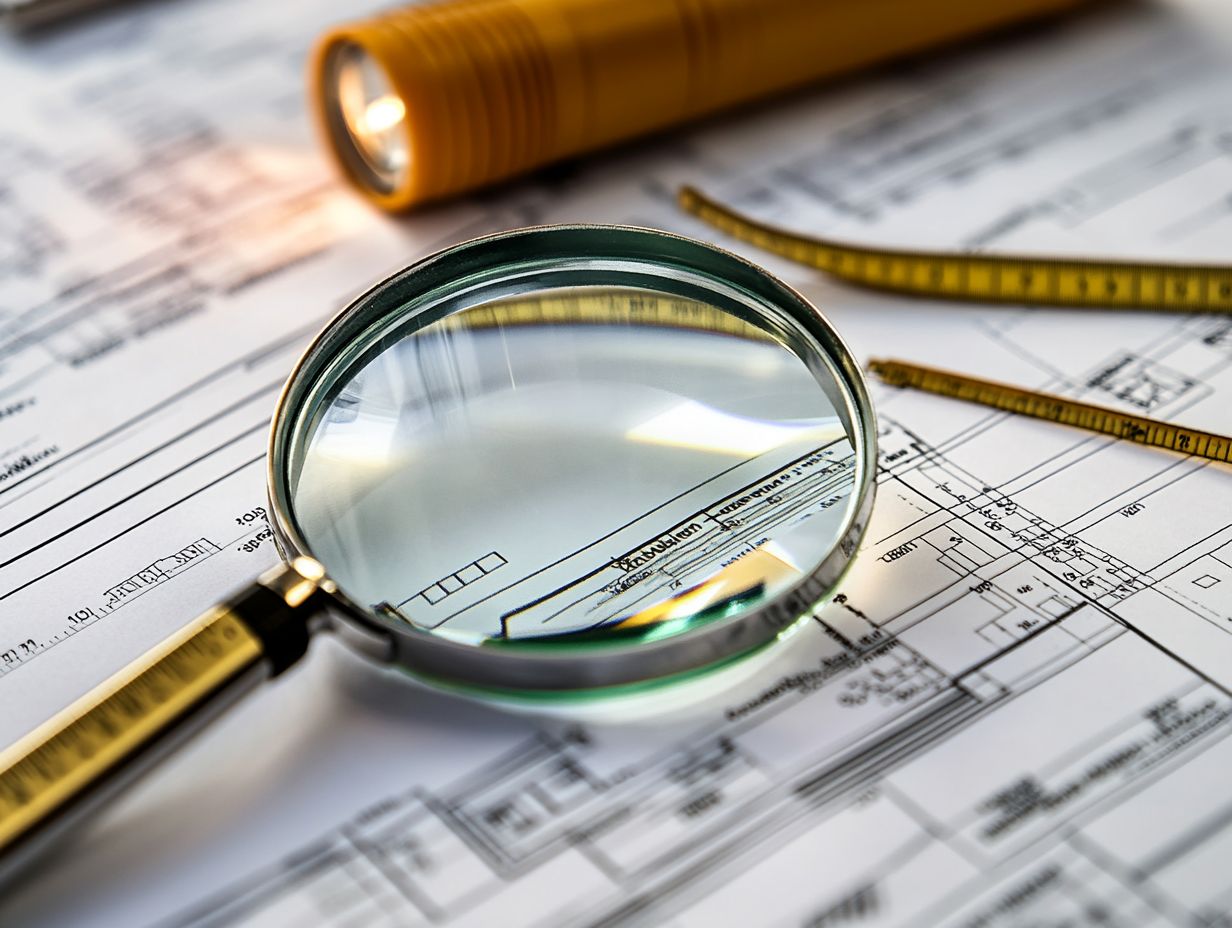
A home inspection report is a detailed document that outlines the condition of a property and identifies potential issues or hazards. Key elements to look for include structural and safety concerns, major systems and appliances, and environmental hazards. When interpreting the information in a report, don t ignore red flags they could save you thousands in repairs!
Understanding Home Inspection Reports
Understanding home inspection reports is crucial for you, whether you re buying or selling in the real estate market. These documents offer a thorough overview of a property s physical condition, bringing to light potential issues that could influence your eligibility to buy, the property s value, and negotiation dynamics.
A carefully prepared inspection report from a professional inspector acts as a detailed account, outlining serious problems, major defects, and even minor issues that could sway your decision as a buyer or affect a seller s obligations during the sale.
What is a Home Inspection Report?
A home inspection report serves as a meticulous document crafted by a professional inspector after conducting a thorough visual examination of a property’s systems, structures, and overall condition.
This report typically includes in-depth evaluations of major components such as HVAC (heating, ventilation, and air conditioning) systems, plumbing, and electrical systems, among others. Each section thoughtfully outlines the performance, strengths, and weaknesses of these essential systems, providing insights that are vital for making informed decisions.
For buyers, grasping these details can mean the difference between acquiring a turn-key home and encountering unexpected repairs. Sellers also gain valuable information from this report by pinpointing areas that may need attention before listing their property, ultimately fostering transparency and trust throughout the transaction process.
Key Elements to Look for in a Report
When you review a home inspection report, it s essential to zero in on critical elements that could profoundly influence your home buying decision. Pay attention to structural concerns, safety issues, and the condition of major systems like HVAC, plumbing, and electrical setups.
These factors can make all the difference in ensuring that your investment is not just sound, but also secure and comfortable for years to come.
Structural and Safety Concerns
Structural and safety concerns stand out as the most critical elements to assess in a home inspection report, as they can signal significant issues that may necessitate extensive repairs or even a professional evaluation by a structural engineer. Look for visible cracks in the foundation, signs of water intrusion, or misalignment of structural elements these are red flags that could jeopardize the integrity of your home over time.
As a buyer, be proactive when reviewing these findings to avoid costly surprises. Addressing these concerns should be a priority, not just for immediate safety, but also for preserving the long-term value of your investment.
By understanding the implications of these warning signs, you empower yourself to make informed choices, potentially steering clear of homes that could turn into financial burdens.
Major Systems and Appliances
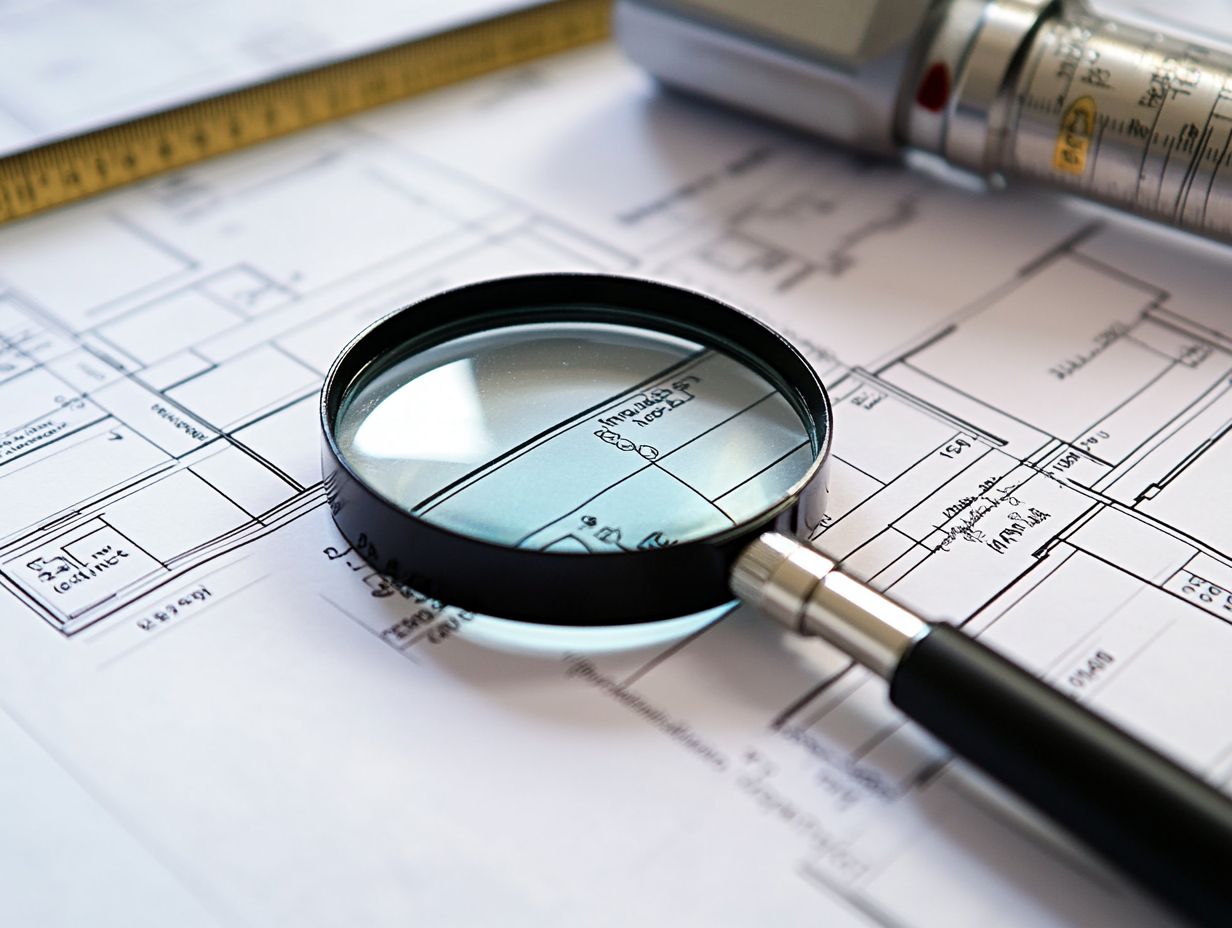
A comprehensive home inspection report should provide you with an in-depth evaluation of essential systems and appliances, such as HVAC (Heating, Ventilation, and Air Conditioning), plumbing, and electrical systems. These components are critical for your property’s functionality and long-term maintenance needs.
Assessing these key elements brings immediate concerns to light. It also helps you foresee potential future repairs that might arise if they are neglected.
Common issues that inspectors frequently uncover include:
- Aging HVAC units that may require replacement
- Plumbing leaks that could lead to significant water damage
- Electrical systems that fail to meet current safety standards
By grasping these factors, you can prioritize maintenance tasks to ensure your home remains both safe and efficient. Regular evaluations of these systems enable you to make informed decisions about upgrades or renovations, ultimately protecting your investment for years to come.
Environmental Hazards
Identifying environmental hazards during a home inspection is crucial. Issues like radon, asbestos, lead piping, water damage, and termite infestations pose significant safety concerns.
These hazards threaten the health of current residents. They can also have serious implications for potential buyers. For many individuals or families contemplating a property, the presence of such risks could be a game-changer in their purchasing decision.
Recognizing how these environmental concerns can lead to costly repairs or health risks emphasizes the importance of effective solutions. Addressing these issues not only boosts the safety and livability of the home but also enhances its overall market value.
Buyers today are increasingly discerning about home inspections, often considering them a vital step in protecting their investment.
Interpreting the Information in a Report
Interpreting the information in a home inspection report is crucial for you as a buyer. It gives you the power to pinpoint red flags, prioritize necessary repairs, and approach the negotiation process with a comprehensive understanding of the property s condition.
This insight enhances your confidence and equips you to make informed decisions moving forward.
What to Do with Red Flags
When you receive a home inspection report that raises red flags, take immediate action. These issues can drastically affect your decision and the seller’s responsibilities during negotiations.
Understanding the implications of these findings gives you the power in negotiations. This enables you to advocate for necessary repairs, price reductions, or credits toward future improvements.
Engaging with a skilled real estate agent can be incredibly beneficial. They can articulate the concerns highlighted in the inspection report and leverage them effectively to your advantage.
If the red flags indicate more serious underlying problems, it may be wise to seek a secondary inspection from a specialist. This will offer you peace of mind and deeper insight into the scope of repairs needed.
Remain proactive in this process. Taking decisive steps now can yield significant benefits and safeguard your investment in the long run.
How to Prioritize Repairs
Prioritizing the repairs highlighted in a home inspection report is essential for you as a buyer. It s about addressing safety concerns and tackling the essential repairs that significantly impact the property’s livability and value.
In this journey, categorize issues by urgency. Ensure that critical safety hazards like electrical issues, plumbing leaks, and structural damages are your first focus.
Once those high-priority concerns are taken care of, shift your attention to less severe, yet still important, repairs. These might include cosmetic updates or routine maintenance tasks that enhance both the aesthetics and functionality of your new home.
By systematically evaluating the severity of each identified problem, you’re not just protecting your investment; you’re also creating a comfortable living space that aligns with your long-term needs.
Working with a Home Inspector
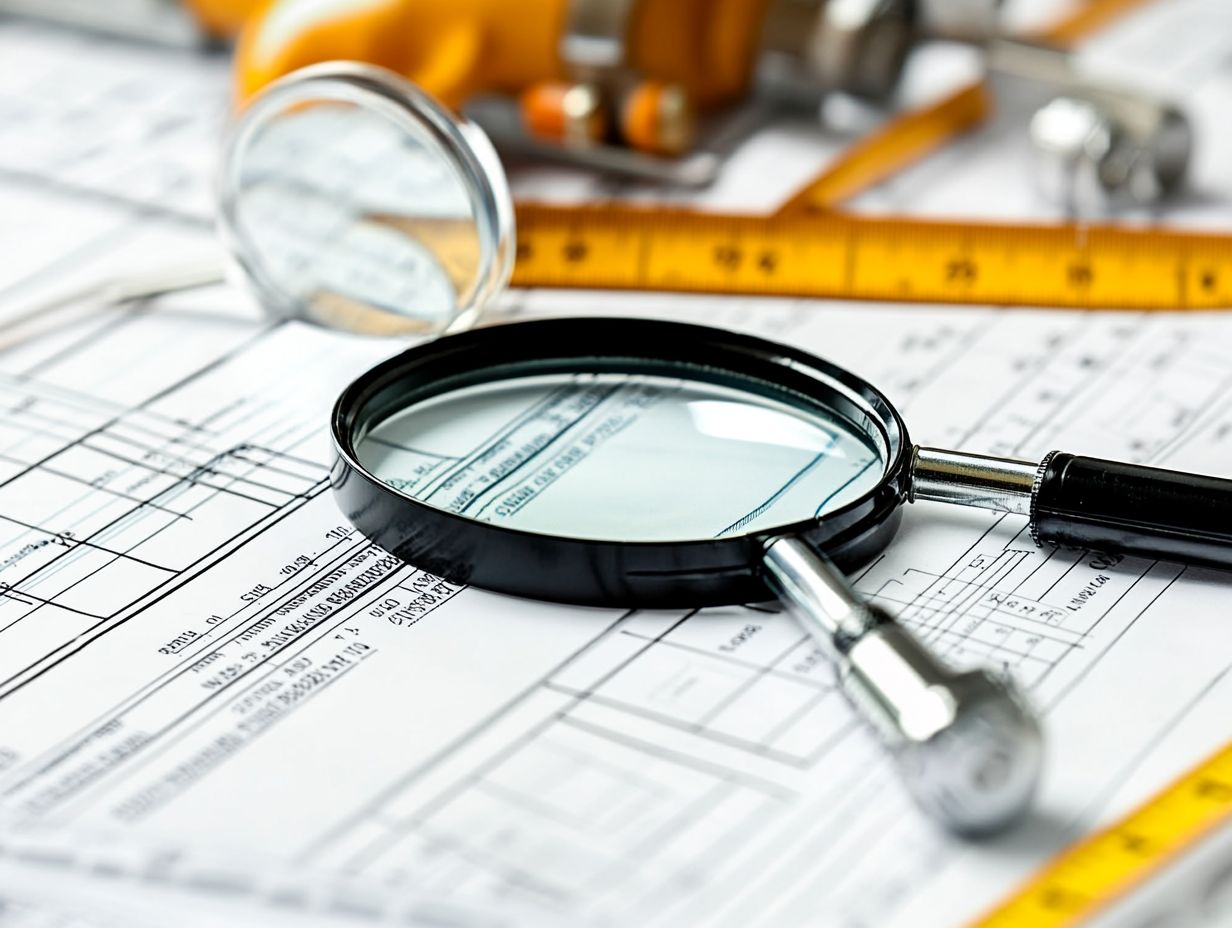
Engaging a qualified home inspector is an essential step in the home buying journey. Their expert assessment offers invaluable insights into the property’s condition, giving you the power to make informed decisions while safeguarding your interests in the process.
Choosing a Qualified Inspector
Selecting a qualified home inspector is crucial for ensuring a thorough and reliable inspection. As a potential buyer, prioritize inspectors certified by reputable organizations, like the American Society of Home Inspectors, to guarantee high-quality service.
Take the time to evaluate the inspector’s experience in the field. Seasoned professionals possess great skill in spotting potential issues that others might overlook. Don t hesitate to ask about the number of inspections they’ve conducted and if they specialize in certain types of properties.
Cost is another significant consideration. Request detailed quotes to understand exactly what services are included. A transparent breakdown of fees is invaluable in assessing the inspector s value, helping you feel confident in your choice and ensuring you receive the quality service you deserve.
Communicating and Asking Questions
Effective communication with your home inspector throughout the inspection process is essential. It allows you to pose questions directly related to the inspection report and gain a clearer understanding of any concerns that may arise.
Initiating an open dialogue can uncover critical insights that might not be immediately evident in the report, such as potential future issues or maintenance advice. Consider asking questions about the age and condition of major systems, such as plumbing and electrical systems, as well as any specific concerns regarding the home s structure.
Engaging a knowledgeable real estate agent can significantly enhance this process. They can help you frame your questions effectively and address any red flags uncovered during the inspection. With both the inspector and agent in your corner, navigating the complexities of a property purchase becomes far more manageable!
Frequently Asked Questions
What should I expect to see in a home inspection report?
A home inspection report should include a detailed description of the property’s condition, including any potential issues or areas that may need repairs or maintenance. It should also include photos and recommendations for further inspections or evaluations.
How can I ensure that my home inspection report is accurate and thorough?
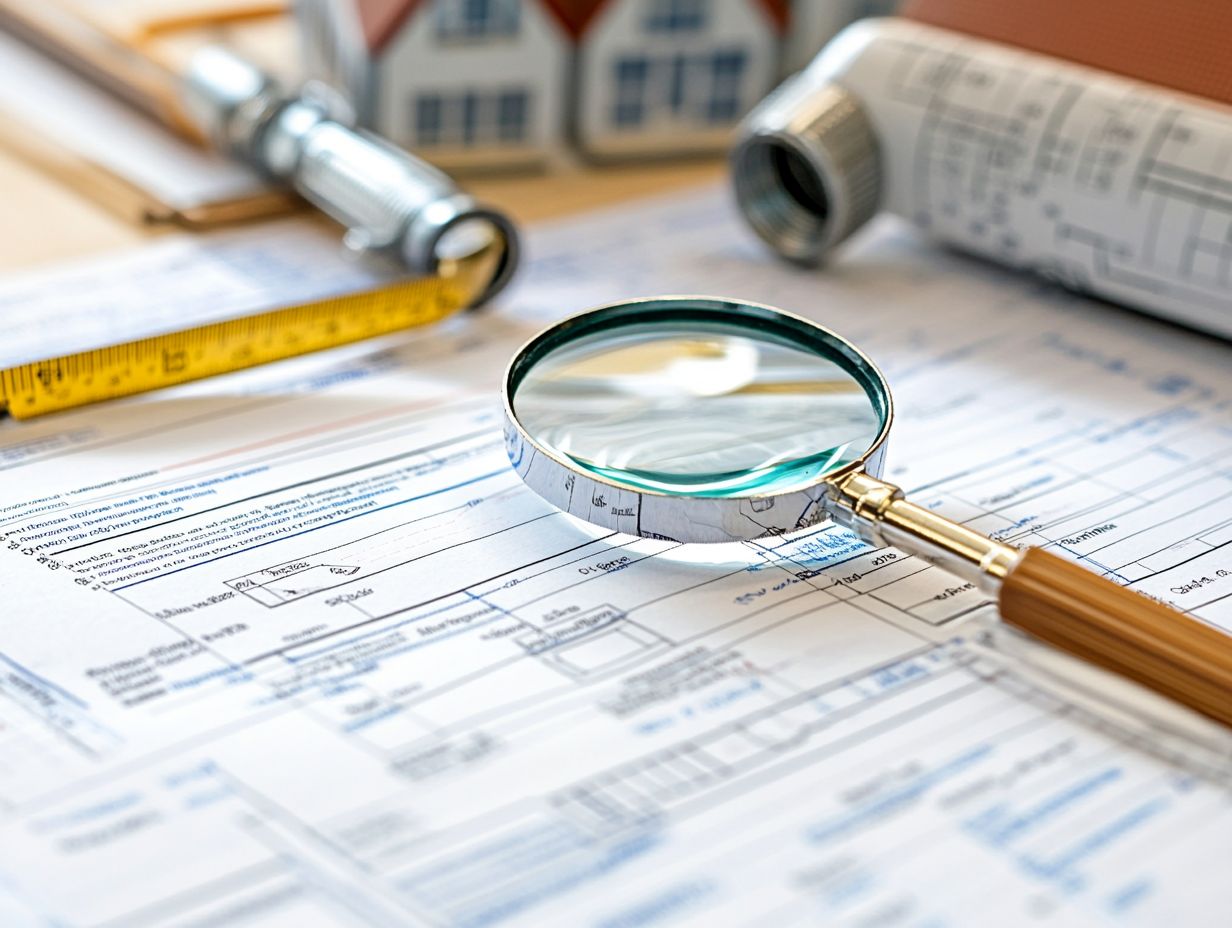
To ensure the accuracy and thoroughness of your home inspection report, hire a reputable and experienced home inspector with a good track record. You can also ask for references and check their qualifications and certifications.
What types of issues or problems should I be particularly concerned about in a home inspection report?
Some common issues to look out for in a home inspection report include structural damage, plumbing or electrical issues, water damage, pest infestations, and mold or mildew growth. These can be costly and difficult to fix, so it’s important to address them before purchasing a home.
Are there any red flags I should watch out for in a home inspection report?
Some red flags include major repairs or replacements needed, safety hazards, and code violations. These issues could significantly impact the safety and livability of the property and may require costly repairs.
What should I do if my home inspection report reveals multiple issues?
If your home inspection report reveals multiple issues, prioritize and address the most urgent and costly repairs first. You may also consider negotiating with the seller to cover the cost of repairs or lower the asking price to account for the repairs needed.
Can I attend the home inspection and ask questions?
Yes, you can attend the home inspection and ask questions. This ensures that your concerns are addressed, and it gives you a better understanding of the report and any potential issues with the property.
In summary, a home inspection is crucial in the home buying process. Make sure to choose a qualified inspector and communicate effectively during the inspection to ensure the best outcome. Start your home buying journey by finding a reliable home inspector today!


